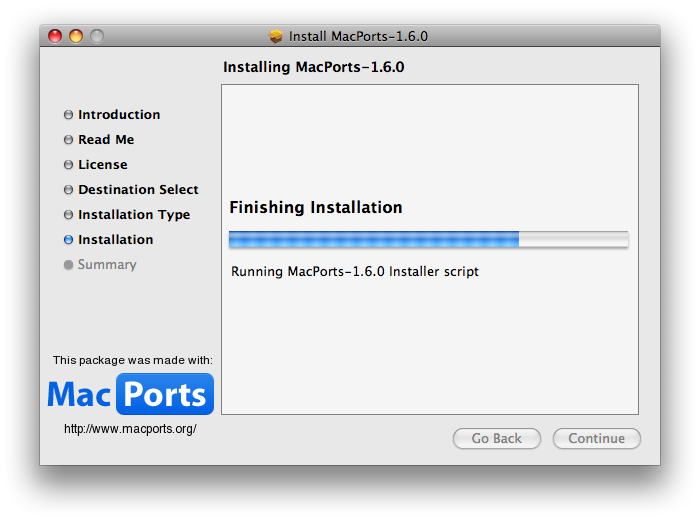

x86_64-apple-darwin13.0.0Ĭhecking target system type. x86_64-apple-darwin13.0.0Ĭhecking host system type. Installing new MacPorts release in /opt/local as root:admin permissions 0755 Tcl-Package in /Library/TclĬhecking build system type. > MacPorts base is outdated, installing new version 2.2.1 Rsync error: some files could not be transferred (code 23) at /SourceCache/rsync/rsync-42/rsync/main.c(1400) Ĭommand failed: /usr/bin/rsync -rtzv -delete-after rsync:///release/tarballs/PortIndex_darwin_13_i386/PortIndex /opt/local/var/macports/sources//release/tarballs Sent 4 bytes received 9 bytes 26.00 bytes/sec rsync: change_dir "tarballs/PortIndex_darwin_13_i386" (in release) failed: No such file or directory (2) Sent 36 bytes received 77 bytes 75.33 bytes/sec Sent 36 bytes received 70 bytes 70.67 bytes/sec

Synchronizing local ports tree from rsync:///release/tarballs/ports.tar Sent 36 bytes received 76 bytes 74.67 bytes/sec Sent 36 bytes received 69 bytes 210.00 bytes/sec
Macports org install#
The setuptools, pip and virtualenv modules should continue to be provided even for EOL Python versions, so that users who need them can still install modules.-> Updating MacPorts base sources using rsync Ports that use a single Python version should use this version if possible.Įnd-of-life Python versions should include the deprecated portgroup so that users know they are EOL and can make an informed decision whether to continue using them. This version is updated to the latest stable release of Python as of the 1st of January each year. Ports that support multiple versions of Python should use the same version by default as the python portgroup. Port maintainers may extend support for older Python versions at their discretion. As always, no port should be removed without first ensuring it has no remaining dependents (remember that this applies recursively), and the permission of relevant maintainers should be obtained. "end-of-life"), unless it is impossible to use a newer version for some reason. Module ports should attempt to support the latest stable version of Python, and should generally avoid using Python versions that are no longer receiving upstream updates (a.k.a. Mailing List archive: Unifying Python Ports Python portgroup Version Policy
Macports org how to#
Look at the examples to know how to convert to it. It uses subports to keep a single Portfile for all versions of python.

The existence of ~/pydistutils.cfg can cause problems during installation of python packages (see #9831).įor Python version 2.5 and later, the option -no-user-cfg has been added to allow this file to be ignored.Ĭonverting to the unified python PortGroupĪs of July 2011, a new unified python PortGroup has been introduced to simplify the maintenance of Python module ports.
Macports org Pc#
pc files, the environment variable PKG_CONFIG_PATH must be set.įor MacPorts Portfiles, the variable configure.pkg_config_path can be used for this purpose. Header files are installed into $/lib/lib/pkgconfig.Other python packages must self-enforce conventions to avoid conflicts. Ports of python modules which use the python PortGroupĪre automatically installed so as to avoid conflicts. Since MacPorts supports several different version of Python, conventions are adopted to ensure that there are no conflicts. New ports should support Python 3.11, with support for older versions added only if there is a good reason. Versions 3.7 and later, however, are the primary focus of work. MacPorts allows the installation of several different versions of python. Many Python programmers report substantial productivity gains and feel the language encourages the development of higher quality, more maintainable code. It offers strong support for integration with other languages and tools, comes with extensive standard libraries, and can be learned in a few days.
Macports org software#
Python is a dynamic object-oriented programming language that can be used for many kinds of software development.


 0 kommentar(er)
0 kommentar(er)
